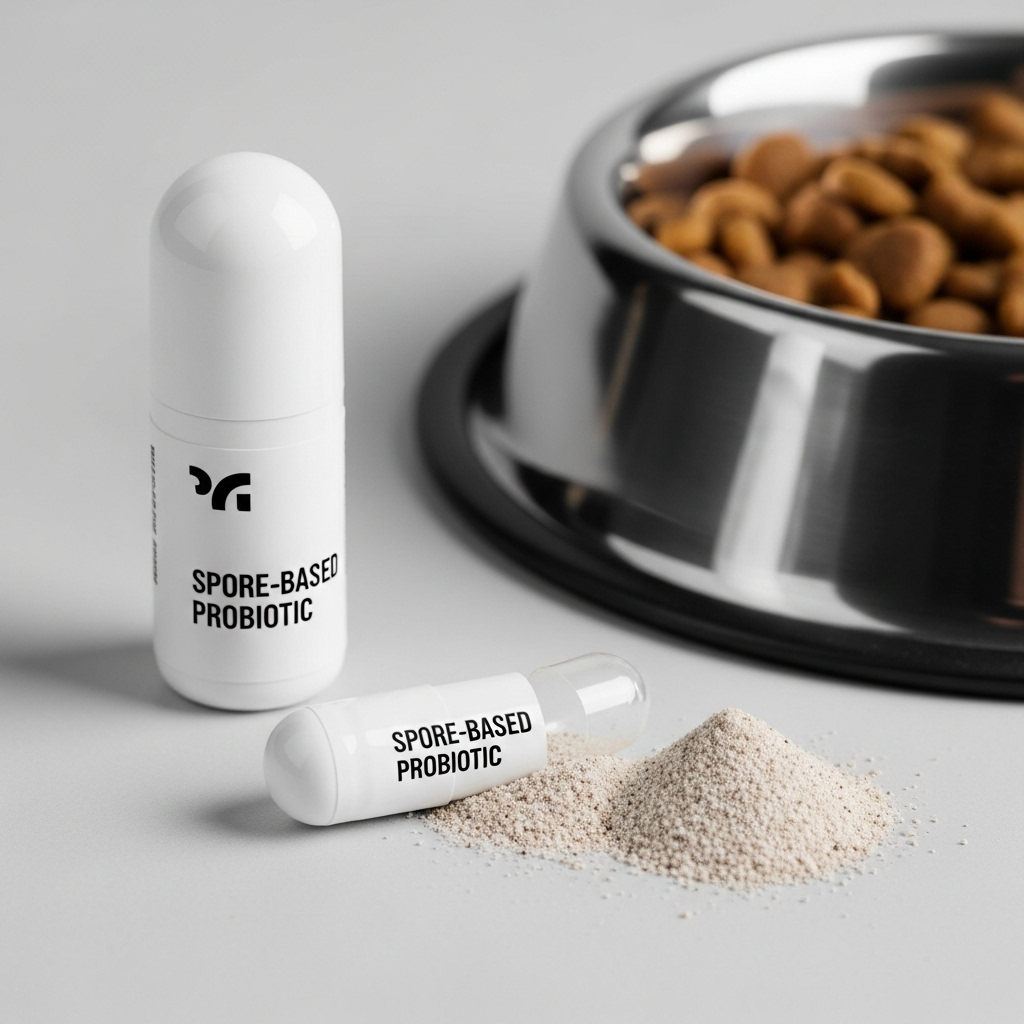Spore-Based Probiotics for Cats (Bacillus coagulans)

Probiotics are increasingly popular among pet owners looking to support their cats’ digestive health, especially after stress, travel, diet changes, or antibiotics. Spore-based probiotics — notably Bacillus coagulans — are marketed for their stability and ability to survive stomach acid. This article explains what Bacillus coagulans is, how spore-based probiotics differ from traditional options, what the evidence says for cats, safety considerations, and practical tips for using them responsibly.
What are spore-based probiotics?
Spore-based probiotics are bacteria that form hardy spores — dormant, highly resistant structures — which can survive heat, storage, and the acidic environment of the stomach. When they reach a favorable environment like the intestine, these spores can germinate and become active bacteria that interact with the gut ecosystem.
How they differ from common probiotics
- Traditional probiotics (Lactobacillus, Bifidobacterium) are usually live vegetative cells and can be sensitive to heat, moisture, and stomach acid.
- Spore formers (Bacillus species, including Bacillus coagulans) are more shelf-stable and often do not require refrigeration.
- Because spores can survive transit through the stomach, a higher proportion may reach the intestines alive.
About Bacillus coagulans
Bacillus coagulans is a spore-forming lactic acid–producing bacterium. It has been used in human dietary supplements and some animal products. B. coagulans produces lactic acid when active, which can help modulate the gut environment. Taxonomically it is a Bacillus, and it should not be confused with other Bacillus species that can be harmful.
Potential benefits for cats
Research specifically in cats is limited but growing. Potential benefits reported in veterinary and clinical contexts include:
- Support for normal digestion and stool consistency (may reduce episodes of diarrhea or loose stools)
- Support after antibiotic therapy to help restore a balanced gut microbiome
- Support during mild stress-related GI upset (travel, boarding, diet transition)
- Possible immune-supporting effects via interaction with gut-associated immune cells
Evidence and limitations
Most robust scientific data for B. coagulans comes from human studies and a smaller number of animal studies. Evidence in cats is promising but not as comprehensive as for humans or some other probiotic strains. That means results can vary by product, dose, and the individual cat’s health. Probiotics are considered supportive care rather than a treatment for serious illnesses.
Safety and precautions
Overall, Bacillus coagulans is regarded as low risk for healthy animals when used as directed, but take these precautions:
- Consult your veterinarian before starting any probiotic, especially for kittens, elderly cats, pregnant queens, or cats with chronic illness or weakened immune systems.
- Avoid giving probiotics to severely ill or immunocompromised animals without veterinary guidance — rare cases of bacteremia have been reported with some probiotics in highly vulnerable patients.
- Watch for adverse signs during the first days (increased gas, vomiting, or worsened diarrhea). These are usually mild and transient; stop and consult your vet if they persist or worsen.
- Use products formulated for pets when possible; human probiotics may differ in dose and excipients.
How to choose and give a product
When selecting a spore-based probiotic for your cat, consider:
- Products labeled specifically for cats (or at least for companion animals)
- Clear listing of strains and colony-forming units (CFUs) at the time of manufacture
- Storage instructions — spore-based products are often stable at room temperature, but follow the label
- Manufacturer quality practices (third-party testing, GMP manufacturing)
Administration tips:
- Follow the product dosing instructions or your veterinarian’s recommendation. Do not exceed recommended dosages.
- Most cats accept probiotics mixed into a small amount of wet food or a favorite treat. If using a capsule, you can open it and sprinkle the powder on food unless the label advises otherwise.
- Give consistently for the time recommended — some owners see improvement in days, for others it may take a few weeks.
Possible side effects and what to do
Side effects are uncommon and usually mild. They may include temporary gas, mild soft stools, or a brief change in appetite. If you notice vomiting, severe or persistent diarrhea, lethargy, or signs of an allergic reaction, stop the product and contact your veterinarian promptly.
Pros and Cons
| Pros | Cons |
|---|---|
| Heat- and acid-stable spores increase survival to the gut; shelf-stable and often room-temperature storage. | Limited species-specific evidence in cats; results vary by individual and product. |
Frequently Asked Questions
1. Are spore-based probiotics like Bacillus coagulans safe for all cats?
Generally safe for healthy cats when used as directed, but consult your veterinarian before giving them to kittens, pregnant or nursing cats, elderly cats, or any cat with a compromised immune system or serious illness.
2. How long before I see results?
Some owners notice changes in stool consistency within a few days; for others, it can take 2–4 weeks. If there’s no improvement after a reasonable trial or if symptoms worsen, stop use and consult your vet.
3. Can I give a spore-based probiotic while my cat is on antibiotics?
Often yes — probiotics can help reduce antibiotic-associated gastrointestinal upset. Space the probiotic dose a few hours apart from the antibiotic dose to increase the chance that live organisms survive. Discuss timing with your veterinarian.
4. Can kittens take Bacillus coagulans?
Some products are formulated for kittens, but because kittens have developing immune systems, check with your veterinarian before use to confirm safety and appropriate dosing.
5. Do I need to refrigerate spore-based probiotics?
Most spore-based probiotics are formulated to be shelf-stable and do not require refrigeration, but always follow the product label.
Key Takeaways
- Spore-based probiotics like Bacillus coagulans are durable, acid-resistant strains that may help support digestive health in cats.
- Evidence in cats is limited but promising; benefits include improved stool consistency and support after antibiotics or stress.
- Use products labeled for pets when possible, follow dosing instructions, and consult your veterinarian before starting them—especially for kittens or sick/immunocompromised cats.
- Side effects are usually mild and temporary; stop the product and seek veterinary advice if serious symptoms occur.
- Probiotics are supportive care and not a substitute for veterinary diagnosis and treatment of persistent or severe conditions.
Disclaimer: This article is for informational purposes only and does not replace professional veterinary advice. Always consult your veterinarian before starting any new supplement for your cat, particularly if your cat has pre-existing health conditions, is on medication, or shows signs of illness.

Leave a Reply